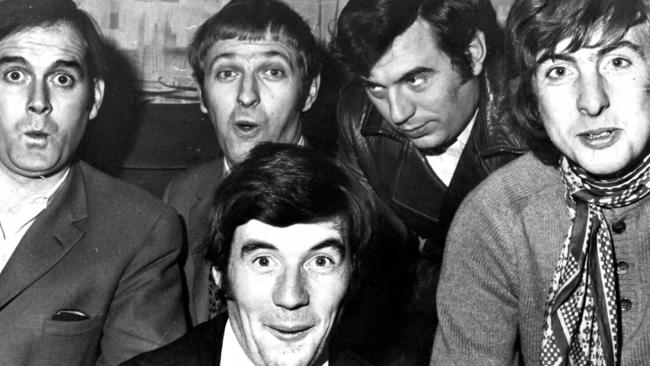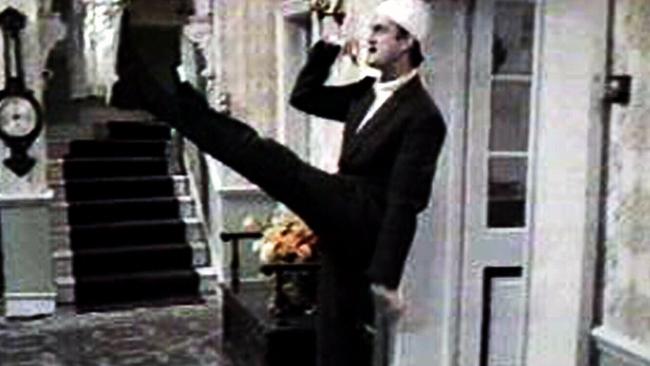John Cleese reflects on the resurgence of Monty Python, his fellow comedians and the sketches they performed
JOHN Cleese on the madness and the magic of Monty Python ... and how a case of severe seasickness led to one of the comedy group’s most enduring sketches.
THE funny thing about the Monty Python reunion show at London’s O2 arena this year was that it happened by accident. Back in November 2013 the five surviving Pythons had had to convene a meeting to discuss a disastrous law case: one of the producers of our 1975 film Monty Python and the Holy Grail had claimed a share of some of the profits of Spamalot, the musical, equal to that which each of the Pythons was getting, and we’d ended up with legal costs in the area of £800,000.
Our meeting, then, was not for the happiest of reasons, but despite this we all felt it was great to be back together: enjoying each other’s company, laughing a lot and horsing around like 60-year-olds. And then someone said: “Let’s do a show to pay our costs!” Within five minutes it was a done deal.
My original assumption was that we would have sufficient diehard fans to justify staging two or three shows, but we were all staggered when tickets for the first show were sold out in 44 seconds and a further four shows within a few hours.
Naturally we were tickled pink: Python had been “old news” for 35 years and the media had certainly treated me as “passé” for decades, so it was lovely suddenly to discover there was this reservoir of affection and appreciation still out there. However, we soon realised we had no idea how the actual show might be received. There was much nervousness and uncertainty and, indeed, foreboding among the more gutless of the Pythons.

Months later I was able to stand on the O2 stage and feel how satisfactory everything had been. And then it struck me that Graham Chapman, the missing Python, should have been there to enjoy it with us.
Graham died of cancer in 1989, at the age of 48, and although he never enjoyed a major success outside Python, within it he played an absolutely crucial part in every aspect of its creation. It goes without saying that he was a very fine performer indeed (until alcoholism shackled him), but to my mind it was as a writer that he injected his unique contribution to the show: humour of a kind that none of the rest of us could have provided — the inspired, off-the-wall line (or idea) that helped to lurch a sketch into new, more fertile territory.
I first found myself collaborating with Graham at Cambridge. When you begin to write comedy, the biggest worry is simply: is this funny? Writing with a partner ensures you get priceless feedback, and Graham and I worked together well: we found each other funny and when we did laugh, we really laughed, Graham screeching and me wheezing. We did not have a lot in common otherwise: his dad was a policeman and he had been to a grammar school where he had been head boy, but we had similarly uneasy relationships with our mothers, which later on provided us with a lot of material.

Frequently, if I was getting bogged down in too much logical and predictable stuff, he would come up with some lunatic suggestion that would liberate us. And it helped enormously that we shared such a similar sense of humour. We may have been different in many other ways, but what he hooted at made me howl: when I split a gut, his intestines opened in the same place.
In addition, he had a priceless, quite uncanny knack of knowing what the audience was going to laugh at. I trusted his judgment of this so implicitly that I never bothered to develop an idea that he didn’t like. The other side of this was that sometimes his encouragement kept me working away at something in which I had lost confidence. A good example from the Python era is the “Cheese Shop”.
The genesis of this sketch was particularly odd. A few days before we wrote it, we travelled down to the south coast to shoot a piece set on a boat. It was a stormy day and since I have a propensity to be seasick, I was apprehensive. However, when we arrived we were assured that things would be all right as we were going to shoot inside the harbour.
I was playing the part of a Python Pepperpot — these were Graham’s creation: women who hooted and squawked and made pensive chicken-like noises — and all I had to do was to come up on deck and screech some inanity or other. Easy, I thought, because the whole take couldn’t last more than about six seconds. But the moment I stepped on to the boat, I knew things were not going to be “all right”.
I was conscious of a distinct rocking motion and as the shot was set up I began to feel worse ... and worse. Then our director Ian MacNaughton said “Right then, let’s shoot” and I climbed down on to the lower deck to await my cue. I stood there long enough to recall that during the Second World War some British sailors on the ships taking supplies to Murmansk had actually died of seasickness and reflected what a happy release that must have been.
Then I heard Ian shout “Action!” and I clambered up on the deck, faced the camera, opened my mouth — and vomited over the camera. I’d heard of projectile vomiting before, but I’d never actually seen it, let alone done it.
“Cut!”

Costume and make-up raced over to clean me up and reapply lipstick, while the camera crew wiped the lens and removed small pieces of carrot from the operator’s hair. The boat continued to rock. “Are you all right, then?” Ian asked. “Yes,” I lied and climbed back down the steps, thinking about all those lucky sailors.
“Action!”
I steeled myself, raced up the steps, forgot my line — and threw up again. “F***!” shouted the operator. There was less sick this time but unfortunately it was better directed, so the cleaning-up operation took longer. Eventually, though, the make-up girls were satisfied, the camera glistened, the operator had found a sou’wester and I was invited to slink down below for a third attempt.
“Action!”
I stumbled up the stairs and this time all went comparatively well, as I got the whole line out before the vomit.
“Print!”
Later that day, in the car taking us back to London, Graham noticed enough signs of life in me to advise that I should try to eat something. Was there anything I fancied? “I think I could manage some cheese,” I replied. So we started looking for food shops, but couldn’t spot one.

Then we passed a chemist’s. “I wonder if they have any cheese,” I mused, to which Graham replied, “If they did, it would be medicinal cheese.” I laughed and said: “There’s a sketch there.”
So when we next sat down to write, we asked ourselves why anyone would go into a chemist’s to ask for cheese. Obviously, because they’d been to a cheese shop that didn’t have any. Hence the sketch. But as it consisted merely of a customer asking for a particular cheese variety and the cheesemonger saying he didn’t have that one for some reason or other, I kept losing confidence in it and asking: “Graham, is this really funny?” Then he’d take his pipe out and say “Yes” and we’d go on for a bit — “Well, stout yeoman, four ounces of caerphilly, if you please”, “Ah! It’s been on order, sir, for two weeks” — and I’d ask again, “Gray, are you quite sure this is funny?” and he’d grin affirmatively. This was repeated every time I got cold feet (“Cheddar?”, “Well, we don’t get much call for it around here”), which was about six more times.
So if it were not for Graham, the cheese shop sketch would not exist and I would be deprived of my happiest Python memory: reading it out for the first time and seeing Michael Palin laugh so much that he slid off his chair on to the ground and just lay there rolling about.
Incidentally, Graham and I never got round to the medicinal cheese idea.
From So, Anyway by John Cleese. RRP $35. Available now from booksellers, online retailers, and as an ebook.
Originally published as John Cleese reflects on the resurgence of Monty Python, his fellow comedians and the sketches they performed


